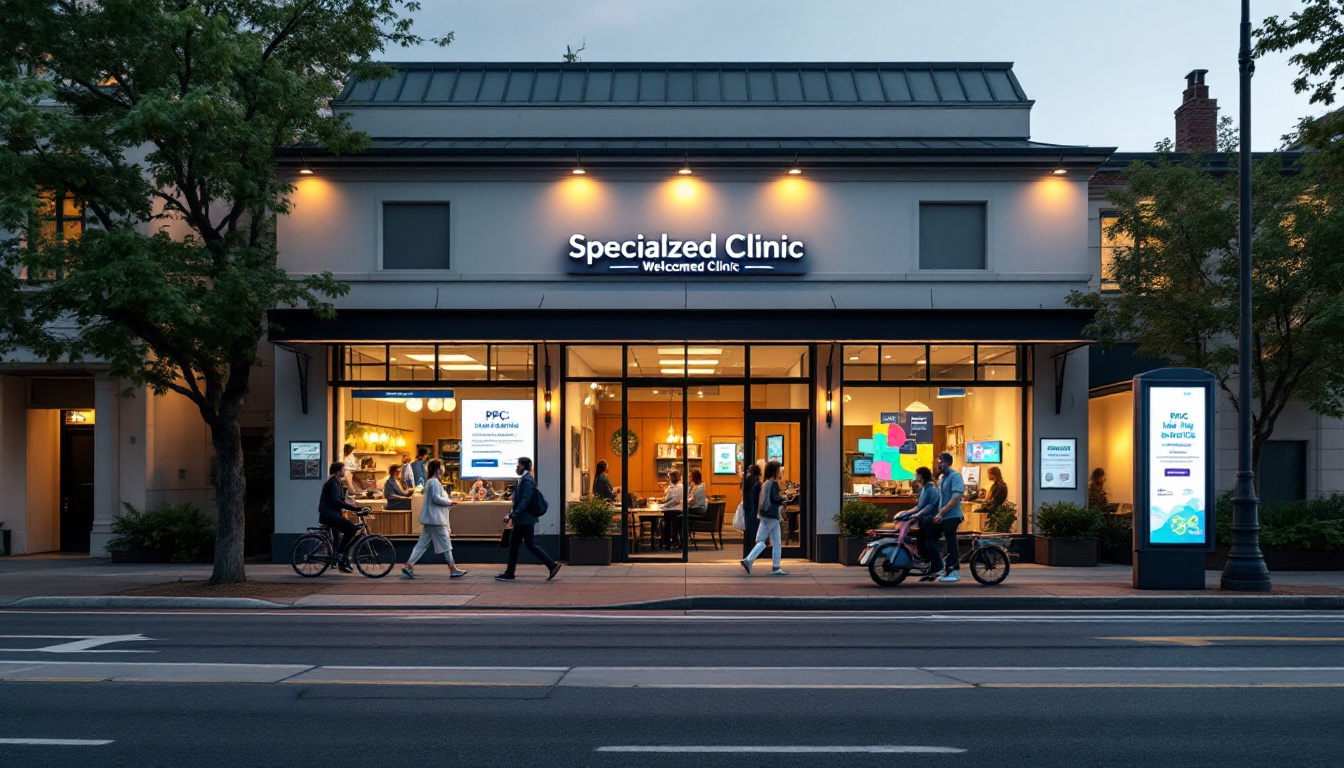The Beginner's Guide to PPC Advertising in Charlotte, NC

PPC advertising, or pay-per-click advertising, has revolutionized the way businesses attract customers online. In a world where visibility is key, understanding how to leverage PPC can lead to significant growth and customer acquisition. This guide will walk you through the basics, especially tailored for businesses in Charlotte, NC.
What is PPC and how does it work?
PPC, or pay-per-click, is an online advertising model where advertisers pay a fee each time their ad is clicked. It’s essentially a way of buying visits to your site rather than attempting to earn those visits organically.

In PPC advertising, the process involves creating ads that appear on search engines and social media platforms based on specific keywords. When a user types a query containing those keywords into a search engine, such as Google, your ad has the opportunity to appear among the search results. If a user clicks on your ad, they are directed to your website, and you incur a cost for that click.
One of the key components of a successful PPC campaign is choosing the right keywords. Advertisers utilize keyword research tools to identify popular and relevant search terms that potential customers are using. This helps in crafting ads that not only reach a targeted audience but also improve the likelihood of conversion.
Additionally, PPC campaigns can be finely tuned through various targeting options, including geographic location, demographics, and even device type. This level of precision allows advertisers to tailor their messages to specific audiences, ensuring that their ads are seen by those most likely to engage with them. For instance, a local coffee shop might choose to target users within a certain radius of its location, while an e-commerce business could segment its audience based on age or shopping behavior.
Moreover, the performance of PPC campaigns can be tracked in real-time, providing valuable insights into user behavior and engagement. Advertisers can analyze metrics such as click-through rates (CTR), conversion rates, and return on ad spend (ROAS) to determine the effectiveness of their ads. This data not only helps in optimizing current campaigns but also informs future strategies, allowing businesses to allocate their budgets more effectively and maximize their advertising ROI.
Why PPC is ideal for businesses in Charlotte, NC
Charlotte, NC, is a bustling city with a diverse economy and a growing population, making it an excellent market for businesses to explore new avenues of customer acquisition. Here are a few reasons why PPC is particularly suitable for businesses operating in this region:
- Targeted Reach: PPC allows businesses to target specific demographics, such as location, interests, age, and more. This targeted approach is beneficial in a city like Charlotte, where understanding the local market can help refine advertising efforts.
- Cost-Effective: Since you only pay when someone clicks your ad, PPC advertising can be more cost-effective compared to other marketing channels. Businesses can set daily budgets, avoiding overspending while still reaching a substantial audience.
- Fast Results: Unlike organic search strategies that can take time to build momentum, PPC campaigns can generate traffic quickly. This immediacy can be crucial for Charlotte businesses looking to promote time-sensitive offers or events.
Additionally, Charlotte's vibrant business landscape, characterized by a mix of startups and established corporations, creates a competitive environment where standing out is essential. PPC campaigns can be tailored to highlight unique selling propositions, allowing businesses to differentiate themselves effectively. For instance, local restaurants can use geo-targeting to attract nearby diners with enticing lunch specials or happy hour promotions, ensuring that their ads reach the right audience at the right time.
Moreover, the city's growing tech scene and increasing internet penetration mean that more residents are online and actively searching for services and products. This trend presents an opportunity for businesses to leverage PPC advertising to capture the attention of potential customers who are already in the buying mindset. With tools like remarketing, businesses can re-engage visitors who didn't convert on their first visit, reminding them of what they were interested in and encouraging them to return, which can be particularly effective in a city where competition is fierce.
How to set up a PPC campaign step-by-step
Setting up a PPC campaign might seem intimidating, but breaking it down into manageable steps can make the process smoother. Here’s a step-by-step guide:
- Define Your Goals: Start by determining what you want to achieve. Are you looking to increase website traffic, generate leads, or drive sales?
- Conduct Keyword Research: Use tools like Google Keyword Planner to find keywords relevant to your business. Focus on long-tail keywords that are specific and likely to attract quality traffic.
- Create Your Ads: Write compelling ad copy that highlights your unique selling points. Use attention-grabbing headlines and clear calls-to-action.
- Select Landing Pages: Ensure the landing page matches the ad content and provides a seamless user experience. The page should encourage conversions, whether that’s making a purchase or filling out a contact form.
- Set Your Budgets and Bids: Decide how much you are willing to spend on your campaign. Allocate a budget based on your goals and define your bidding strategy.
- Launch the Campaign: Once everything is in place, launch your PPC campaign. Monitor its performance closely in the initial days.
After launching your campaign, it's crucial to track its performance using analytics tools. These tools can provide insights into which ads are performing well and which ones may need adjustments. Pay attention to metrics such as click-through rates (CTR), conversion rates, and cost per acquisition (CPA). This data will help you make informed decisions about optimizing your ads and budget allocation. Regularly reviewing these metrics can lead to a more effective campaign over time, allowing you to refine your strategy based on real-world performance.
Additionally, consider A/B testing different versions of your ads to see which ones resonate more with your audience. By changing elements like headlines, images, or calls-to-action, you can gather valuable information on user preferences. This iterative process not only enhances the effectiveness of your ads but also helps in understanding your target market better. As you gain insights from your campaigns, you can apply these learnings to future PPC efforts, ensuring continuous improvement and greater ROI.
Tips for choosing the right PPC keywords
Choosing the right keywords is crucial for the success of your PPC campaign. Here are some effective strategies to guide you:
- Focus on Relevance: Ensure that the keywords you select are directly related to the products or services you offer. Irrelevant keywords can attract the wrong audience, leading to wasted spend.
- Use Negative Keywords: Incorporate negative keywords to exclude irrelevant traffic. This means your ads won't show for search queries that include those terms, helping to increase the overall quality of your traffic.
- Analyze Competitors: Take time to analyze competitors' keywords. Tools such as SEMrush can provide insights into what keywords are driving traffic to their sites.
- Long-Tail Keywords: These keywords are often less competitive and more specific, which can lead to higher conversion rates. For example, instead of “shoes,” consider “women's running shoes in Charlotte, NC.”
Additionally, it’s important to regularly review and update your keyword list. The digital landscape is constantly evolving, and what worked last month may not yield the same results today. Utilize analytics tools to track the performance of your keywords, and be prepared to pivot your strategy based on data-driven insights. This proactive approach not only helps in optimizing your ad spend but also ensures that your campaigns remain relevant to current market trends.
Another effective strategy is to leverage local keywords if your business has a geographical focus. For instance, if you operate a bakery in Seattle, incorporating location-specific keywords like “best cupcakes in Seattle” can significantly enhance your visibility among local customers. This not only helps in attracting a targeted audience but also increases the likelihood of converting clicks into actual sales, as users searching for local options are often further along in the buying process.
How to track and measure success in PPC
Tracking and measuring the performance of your PPC campaign is essential to optimize your strategy. Here’s how to evaluate success:

- Set Up Conversion Tracking: Use tools like Google Ads Conversion Tracking to monitor actions that users take on your site after clicking your ads, such as purchases or sign-ups.
- Monitor Key Metrics: Pay attention to metrics such as click-through rate (CTR), conversion rate, and return on ad spend (ROAS). High CTR but low conversion may indicate an issue with your landing page.
- Regular Reporting: Create regular reports to analyze the performance of your campaigns. Look for trends and insights that can inform future changes.
- A/B Testing: Continuously test different ad copies, headlines, and keywords. Analyze which variations perform better and refine your strategy accordingly.
In conclusion, PPC advertising offers Charlotte businesses a valuable opportunity to reach potential customers efficiently. By understanding the fundamentals of PPC, setting up targeted campaigns, and tracking performance effectively, businesses can harness the power of online advertising to drive growth.

As a Google Ads expert, I bring proven expertise in optimizing advertising campaigns to maximize ROI.
I specialize in sharing advanced strategies and targeted tips to refine Google Ads campaign management.
Committed to staying ahead of the latest trends and algorithms, I ensure that my clients receive cutting-edge solutions.
My passion for digital marketing and my ability to interpret data for strategic insights enable me to offer high-level consulting that aims to exceed expectations.



















